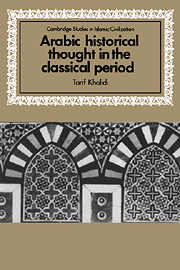3 - History and Adab
Published online by Cambridge University Press: 23 November 2009
Summary
In the course of the third/ninth century, historical writing began to respond to the increasing influence of Adab and, in doing so, to modify its content, form and perspective. A gradual shift in mood carried history into a new and more ‘secular’ environment. In this environment, the style and horizons of Hadith were no longer seen to be adequate carriers of a history now required to be more pragmatic and more sensitive to the challenge of foreign cultures. Adab was the chief instrument of this transformation.
In many European histories of Arabic literature the word Adab is translated as ‘Belles-Lettres’. One could argue that the classical Greek ‘Paideia’ is a more accurate rendering of the term since Adab, like Paideia, refers to a process of moral and intellectual education designed to produce an adib, a gentleman-scholar, and is thus intimately connected with the formation of both intellect and character. In its earliest days Adab meant education. With time it came to mean a special kind of education, a moral and intellectual curriculum aimed at a particular urban class and reflecting the needs and aspirations of that class. To understand its influence on historical writing, one must first explore the environment in which Adab grew and attempt to show how and why it came to exercise that influence.
The rise of Adab
We saw above how early Hadith, by casting its net wide over the lore of the community, pulled in a mixed bag of ‘traditions’, an undifferentiated mass of reports differing greatly in nature and religious importance.
- Type
- Chapter
- Information
- Arabic Historical Thought in the Classical Period , pp. 83 - 130Publisher: Cambridge University PressPrint publication year: 1994



